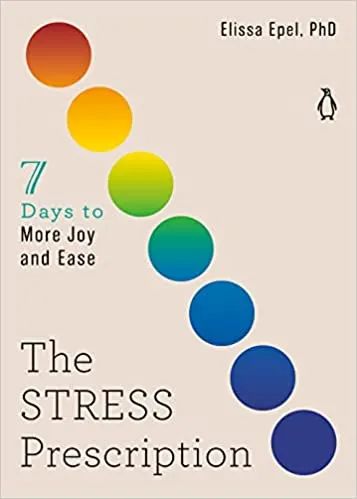Are you suffering from chronic stress? Many of us are — whether we’re stressed out by our jobs, complicated relationships, caregiving responsibilities, or the general state of the world.
你是否经常倍感压力?我们中的许多人都是如此——无论我们是由于工作,复杂的人际关系,对家庭的责任,还是世界的总体状况。

That’s where Elissa Epel’s new book, “The Stress Prescription,” comes in. A health psychologist and director of the Aging, Metabolism, and Emotions Center at the University of California, San Francisco, Epel explains how stress affects our bodies and minds — including our health, happiness, and longevity — and how to manage it in the best way possible.
这就是埃丽莎·埃佩尔的新书《压力处方》(The Stress Prescription)的切入点。埃佩尔是加州大学旧金山分校衰老、新陈代谢和情绪中心的健康心理学家和主任,她解释了压力是如何影响我们的身心的——包括我们的健康、幸福和长寿——以及如何以最好的方式管理它。
Too many of us are in a constant state of alertness, she argues, which makes us ill-prepared to navigate the everyday stressors and bigger upsets that occur when living a full life. We may think we’re relaxed, but we’re actually maintaining a low-level vigilance that’s hard on our bodies. Constant physiological strain can shorten our telomeres (the caps at the ends of our DNA that protect it from aging)—a process she wrote about in her bestselling book, “The Telomere Effect.”
她认为,我们中有太多人一直处于警觉状态,这使得我们没有准备好应对日常压力和生活中出现的大量烦恼。我们可能认为自己很放松,但实际上我们在保持一种低水平的警惕性,这对我们的身体来说很难适应。持续的生理压力会缩短我们的端粒(DNA末端防止衰老的帽状结构)——她在她的畅销书《端粒效应》中描写了这个过程。
Epel emphasizes that not all stress is inherently bad — and that we shouldn’t aim for a stress-free life. We need our physiological stress response to survive, as it can come in handy when we’re gearing up to perform or facing an actual life-or-death threat.
埃佩尔强调,并非所有的压力都是不好的,我们不应该追求无压力的生活。我们需要生理压力反应来生存,因为当我们准备表演或面临实际的生死威胁时,它可以派上用场。
“Anything worth doing will have aspects of stress woven through: challenge, discomfort, risk. We can’t change that. But what we can change is our response,” she says.
“任何值得做的事情都会有压力的一面:挑战、不适、风险。我们无法改变这一点。但我们能改变的是我们的反应,”她说。
If we can learn how to handle stress better and build up stress resilience, we’re more likely to thrive, she argues. To do that, she recommends seven guidelines and offers specific practices to get us there.
她认为,如果我们能学会如何更好地应对压力,并建立抗压能力,我们就更有可能茁壮成长。为了做到这一点,她推荐了七条指导方针,并提供了具体的实践方法。
01 Embrace uncertainty
拥抱不确定性
Life is uncertain, and things will not always go according to plan. But, if we get better at tolerating uncertainty, it can lead to less stress, as well as other good things — like being able to trust others, collaborate, and cooperate more.
生活充满变数,事情不会总是按计划进行。但是,如果我们能更好地忍受不确定性,就能减少压力,以及其他好的事情——比如能够信任他人,配合,更多更好地合作。
Tolerating uncertainty means not always having rigid expectations of the future. “Strong expectations can hurt us whether they’re positive (something we’re looking forward to) or negative (something we’re dreading). Better to loosen our expectations as much as we can,” says Epel.
容忍不确定性意味着不要总是对未来抱有严格的期望。“强烈的期望会伤害我们,无论是积极的(我们期待的事情)还是消极的(我们害怕的事情)。最好是尽可能弱化我们的期望,”埃佩尔说。
One way to do that, she says, is to practice mindfulness meditation, which keeps you focused on the present and prevents ruminating too much on what unknowable thing might happen. While you’d be forgiven for thinking it’s better to anticipate disasters so that you’re prepared for them, she argues against that approach. Anticipating the worst leads to spikes of cortisol that are harmful to your health.
她说,做到这一点的一种方法是练习正念冥想,它让你专注于当下,防止过多地思考不可知的事情。如果你认为提前预测灾难,以便为灾难做好准备,这是可以理解的,但她反对这种做法。期待最坏的结果会导致皮质醇激增,这对你的健康有害。
02 Don’t fret about what you can’t control
不要为你无法控制的事情烦恼
Like the old adage goes, when things go wrong, it’s good to recognize what’s in your control and what isn’t — and then focus your attention on changing what’s under your control. For example, if your spouse suddenly becomes incapacitated, and you’re called upon to become a caregiver — a huge stressor for most people — it’s better to accept reality, manage what you can, and let go of the rest.
就像那句古老的格言所说的,当事情出了问题时,最好认识到什么在你的控制范围内,什么不在你的控制范围内——然后把注意力集中在改变你控制范围内的事情上。例如,如果你的配偶突然丧失了行为能力,而你被要求去照顾他们——这对大多数人来说是一个巨大的压力源——最好接受现实,尽你所能去管理,放下其他的事情。
This may not sound easy. But with reflection, says Epel, you might find that many things you ruminate about — what others think of you, a potential illness or diagnosis, the outcome of an election — are not under your control, making worry needless and even problematic. Once you realize this, you can focus on accepting what’s not controllable and making better choices about how to handle stressors actually under your control. That might mean letting go of superfluous activities, taking breaks in your busy life for some restful breathing, or practicing self-compassion.
这听起来可能并不容易。但埃佩尔说,经过反思,你可能会发现,你反复思考的许多事情——别人对你的看法、潜在的疾病或诊断、选举的结果——都不在你的控制之下,让担心变得不必要,甚至是有问题的。一旦你意识到这一点,你就可以专注于接受无法控制的事情,并在如何处理压力源方面做出更好的选择。这可能意味着放弃多余的活动,在繁忙的生活中休息一下,放松呼吸,或者练习自我同情。
03 Harness the body’s stress response to meet challenges
利用身体的压力反应来迎接挑战
Our bodies are well designed to enter into fight-or-flight mode when we are under threat or facing difficulties. But the physical effects of stress depend on our attitude — whether we see it as a bad thing or recognize the positive, energizing elements of that mode. When we see the benefits of stress, we actually show a healthier stress response in our bodies — which can help us overcome challenges.
当我们面临威胁或困难时,我们的身体会进入“战斗或逃跑”模式。但是压力对身体的影响取决于我们的态度——我们是把它看作一件坏事,还是承认这种模式中积极的、充满活力的元素。当我们看到压力的好处时,我们的身体实际上会表现出更健康的压力反应——这可以帮助我们克服挑战。
“When we focus on the benefits of stress, we feel less stress about stress, pay attention to positive cues rather than threatening cues, and approach situations more confidently rather than avoid them,” writes Epel.
埃佩尔写道:“当我们关注压力的好处时,我们对压力的压力就会减少,关注积极的线索而不是威胁的线索,更自信地处理情况,而不是避免它们。”
This kind of reframe can be helpful for accepting our mistakes along the way when we try new things. Knowing that failure, challenge, and stress can be an important part of reaching our goals can help us to take them less to heart — and prevent us from giving up too soon.
当我们尝试新事物时,这种重构有助于我们接受错误。知道失败、挑战和压力是实现目标的重要组成部分,可以帮助我们不把它们放在心上,防止我们过早放弃。
How to do it? Reframed statements around stress — like saying, “This is exciting! I can appreciate this feeling” as opposed to “This is so stressful. I hate this feeling.” — have been found over many studies to reduce our negative feelings about stress.
怎么做呢?围绕着压力重新组织陈述——比如说,“这太令人兴奋了!我能欣赏这种感觉”,而不是“压力太大了。我讨厌这种感觉。——在许多研究中都被发现可以减少我们对压力的负面情绪。
04 Train your cells to metabolize stress better
训练你的细胞更好地代谢压力
Chronic stress is never good for us. But getting an occasional shot of high stress that our bodies can tolerate and easily recover from — something Epel calls “hormetic stress” — is actually good for us. It builds resilience at the cellular level and makes us better prepared to handle future, unexpected stressors.
长期的压力对我们从来都没有好处。但偶尔来点我们身体能够承受并容易恢复的高压力——埃佩尔称之为“hormetic stress”——实际上对我们有好处。它在细胞水平上建立弹性,使我们更好地准备应对未来意想不到的压力。
While all exercise is good for managing stress and improving our health, Epel recommends high-intensity interval training (HIIT), which gives you the most bang for your buck. HIIT involves short bursts of high-intensity exercise followed by a recovery period, and it has become very popular for people who have less time to exercise.
虽然所有的运动都对管理压力和改善我们的健康有好处,但埃佩尔推荐高强度间歇训练(HIIT),它能给你带来最大的回报。HIIT包括短时间的高强度运动,然后是恢复期,在那些没有时间锻炼的人中间非常流行。
For those who can’t do HIIT, there are other ways to expose our cells to short bursts of stress, such as taking a cold shower or using a sauna. Though the research is relatively new, Epel provides some evidence that both of these can increase stress resilience and lead to better health, too (though you might want to check with a doctor before trying them out).
对于那些不能做HIIT的人来说,还有其他方法可以让我们的细胞暴露在短时间的压力下,比如洗冷水澡或蒸桑拿。虽然这项研究相对较新,但埃佩尔提供了一些证据,证明这两种方法都能增强抗压力能力,并带来更好的健康(尽管在尝试它们之前你可能想要和医生确认一下)。
05 Use nature to recalibrate
利用自然重新校准
There is ample evidence that spending time in nature reduces stress and improves well-being. Epel argues that “exposure to nature, in all forms and contexts, is one of the most powerful and immediate ways to reduce stress.”
有充分的证据表明,花时间在大自然中可以减轻压力,提高幸福感。埃佩尔认为,“在各种形式和背景下,接触大自然是减轻压力最有效、最直接的方法之一。”
Being in green spaces allows us to experience “attention restoration” — a kind of recovery from the stress of cognitive overload and constant stimulation that many people experience in their everyday lives. Experiencing nature can also produce feelings of awe, which, in turn, reduce stress — along with a host of other benefits. If you don’t have easy access to the woods or an urban park, take heart. Even looking out at the night sky or watching nature videos can be calming.
在绿色空间中,我们可以体验到“注意力恢复”——从许多人在日常生活中经历的认知过载和持续刺激的压力中恢复。体验自然还能产生敬畏之情,进而减轻压力——还有许多其他好处。如果你不方便去树林或城市公园,也请振作起来。即使是仰望夜空或观看自然视频也能让人平静下来。
06 Practice deep rest
练习深度休息
We all need to relax in order to reduce stress in our lives. But, says Epel, we also need to find moments of deep relaxation where we experience “protected, tech-free, rest-focused downtime for ourselves.” This kind of deep rest is different from what we typically think of as “relaxing” — like lounging on a couch and watching TV or walking our dog at night. It’s more about the kind of experience you might have on a meditation retreat, where you practice letting go of all responsibility and just being.
为了减少生活中的压力,我们都需要放松。但是,埃佩尔说,我们也需要找到深度放松的时刻,让我们体验“受保护的、没有科技产品的、专注于休息的停机时间”。这种深度休息不同于我们通常认为的“放松”——比如躺在沙发上看电视或晚上遛狗。它更多的是一种你在冥想静修时可能会有的体验,在那里你练习放下所有的责任,只做自己。
Of course, sleeping or napping are ways we can get that kind of rest — if we’re good at them, which many of us aren’t. But there are other things we can do, too. Epel suggests specific deep breathing exercises, which is something under our control that can quickly put us into a relaxed state — and has all kinds of benefits for our physiology.
当然,睡觉或打盹是我们获得这种休息的方式——如果我们擅长的话,但我们中的许多人都不擅长。但我们也可以做其他事情。埃佩尔建议进行特定的深呼吸练习,这是我们可以控制的,可以迅速让我们进入放松状态,对我们的生理机能有各种好处。
07 Find moments of joy in your life
在你的生活中寻找快乐的时刻
When we feel happy, we tend not to feel so stressed out. So, says Epel, it’s important to cultivate more moments of joy in our lives — especially moments of purpose and meaning. “The science of happiness and joy is pretty clear: It’s good for the mind, good for the body, good for stress resilience,” she says.
当我们感到快乐时,我们往往不会感到压力太大。所以,埃佩尔说,在我们的生活中培养更多的快乐时刻是很重要的——尤其是那些有目标和意义的时刻。她说:“关于幸福和快乐的科学原理非常清楚:它对大脑、身体、抗压能力都有好处。”
While chasing happiness can actually hurt your well-being if you get too obsessive, you can simply turn your mind toward noticing the positive. One practice she suggests (which I took to heart, personally) is changing the way you wake up and go to bed at night. Rather than startling awake and immediately thinking about all you need to get done, she suggests taking a moment to imagine what you’re looking forward to that day. Similarly, before going to sleep at night, you can recount the happiest parts of your day and what you’re grateful for.
如果你过于执着,追逐幸福实际上会伤害你的幸福,你可以简单地把注意力转向积极的方面。她建议的一个做法(我个人把它记在心里)是改变你晚上起床和睡觉的方式。她建议花点时间想象一下那天你期待什么,而不是突然醒来,立即思考你需要做的所有事情。同样,在晚上睡觉前,你可以回想一下一天中最快乐的部分和你感激的事情。
“Happiness and gratitude give us that reserve capacity, the charge to our battery,” she writes. “They give us the resources to zoom out, take a healthy perspective, see the challenge, stay flexible, and be resilient.”
她写道:“快乐和感恩给我们储备能量,给我们的电池充电。他们为我们提供了资源,让我们能够缩小视野,以健康的视角看待挑战,保持灵活性,并具有复原力。”
While some of these tips for managing stress may be familiar to you, it’s definitely helpful to have them all in one place. Thankfully, the book is short and easy to read, yet still chock full of research — as well as ideas on how to make the findings work for you, personally. By following Epel’s prescription, you are bound to increase your resilience to stress — and be happier and healthier for it.
虽然这些管理压力的技巧你可能很熟悉,但把它们都放在一个地方肯定是有帮助的。值得庆幸的是,这本书很短,易于阅读,但仍然充满了研究——以及如何让这些发现为你个人工作的想法。按照埃佩尔的处方,你一定会增强你对压力的适应力——并因此变得更快乐、更健康。




